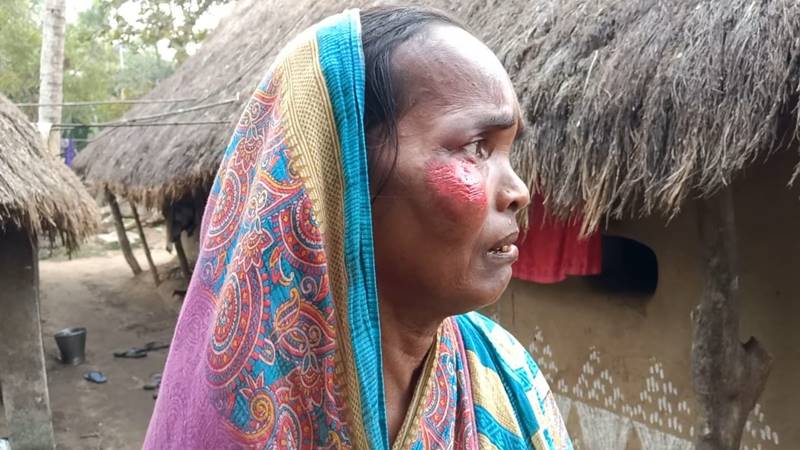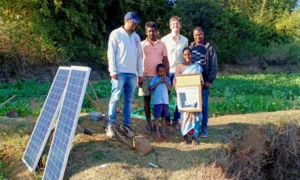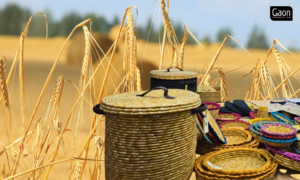Protests against a proposed steel manufacturing plant in Dhinkia village in Jagatsinghpur district of Odisha turned violent yesterday, January 14, with as many as 40 protesters injured after police personnel allegedly baton charged to disperse the crowd of almost 500 villagers. Those injured, it is being informed, include as many as 20 women and children.
Two weeks prior to the clash, the villagers had set up barricades to prevent the entry of government officials and the police on their cultivations, which are to be acquired for the steel plant construction. But yesterday, around 500 police personnel entered the village and demolished the cultivation resulting in a clash with the local residents, claim the protesting villagers.
As per the initial reports, the faceoff between the protesting villagers and the police happened following the latter’s refusal to allow the local farmers to access their betel vines.
“We are hell-bent on not giving an inch of our land to establish a steel plant by the JSW . We opposed the entry of the armed police into the villages as a result police used batons against us,” Ramesh Swain, a villager of Dhinkia told Gaon Connection.
Also Read: Tribal communities in Odisha’s Koraput protest bauxite mining to save their Mali hill
However, the police are contesting such claims.
“We are not forcing betel vine farmers to dismantle their farms,” Umesh Panda, the Additional Superintendent of Police of Jagatsinghpur, told Gaon Connection. “On Friday [January 14], we appealed to all the farmers to allow the authorities to acquire their betel vines over the government lands. Some persons with an ulterior motive opposed the land acquisition works in Dhinkia for which police used batons to disperse them,” he added.
The police official went on to inform that some policemen sustained injuries when agitators attacked them. “Police have arrested six persons including Debendra Swain, the former panchayat samiti member of Dhinkia for fomenting trouble in Jagatsinghpur Dhinkia,” informed Panda.
Why the protest?
In the eye of the storm is a proposed steel manufacturing plant of JSW Steel Ltd. The plant is to be set up across 1173.58 hectares of land spread across the three villages of Dhinkia, Nuagaon and Gadakujang in the district, about 60 kilometres from the state capital Bhubaneswar. It is expected to manufacture 13.2 million tonnes per annum of steel.
“The state government has no right to hand over the 2,900 acres of land to JSW as the government had illegally acquired the land for the steel plant of the South Korean steel giant Posco. This acquisition, done six years back, was only on pen and paper. The proposed steel plant of Posco had been shelved,” Manorama Khatua, a resident of Dhinkia and an activist from the Jindal Pratirodh Sangram Samiti, told Gaon Connection.
“Now, after six years they are again trying to hand over the land to JSW. There will be no steel plant in our areas and we want our land back. We are determined to oppose the establishment of the proposed steel plant of JSW,” he added.
Jindal Pratirodh Sangram Samiti contests that the proposed steel plant will deprive about thirty thousand local villagers of their livelihoods who depend on the land for cultivation of rice and betel.
Meanwhile, the government officials informed Gaon Connection that Industrial Infrastructure Development Corporation (IDCO) — an agency of the state government – is the owner of the acquired land.
“The high level clearance authority chaired by the Chief Minister on June 2, 2017 transferred the land in favour of Sajjan Jindal-led JSW Steel. The authorities acquired lands legally by paying proper compensation amounts to the villagers for which they have no legal right to reoccupy the land,” Kanhu Charan Dhir, the Additional District Magistrate (ADM) of Paradip told Gaon Connection. “Large numbers of villagers are in favour of industrialisation. But a few persons with an ulterior motive are opposing the project,” he added.
‘Dhinkia village sealed’
Meanwhile, entry points to the Dhinkia village have been allegedly sealed off by the police and activists are not allowed to meet the protesting farmers, complain villagers.
“We were stopped around one kilometer from Dhinkia at village Trilochanpur by some armed anti-socials elements in the presence of police when we were on our way to meet the victims who suffered injuries after police use batons against them when they were peacefully protesting against the dismantling of their betel vineyards,” Prafulla Samantray, the president of Lok Shakti Abhiyan, told Gaon Connection.
Additionally, Mahendra Parida, a leader of the Communist Party of India (Marxist-Leninist) [CPIML] told Gaon Connection that the ban on entering the village is not justified as it will not let the wounded villagers get much needed medical aid.
“This is nothing but an attempt to stop us from supporting the farmers of Dhinkia, Nuagaon and Gadakujang gram panchayats who are fighting a legitimate battle. To protect their paan (betel vineyards), dhan (paddy crops) and mina (fish),” Parida said.
‘Steel plant anti-environment’
While opposing the setting up of the plant, the Lok Shakti Abhiyan leader also pointed out that the construction of the steel plant in the coastal area is against the environment.
“As per a recent analysis by NASA [National Aeronautics and Space Administration], the port town of Paradip and its nearby seaside areas could be submerged by the incoming waters of the Bay of Bengal by the end of the 21st century,” Samantray told Gaon Connection. “It is feared that Paradip will go under 0.59 meter of seawater in 2100 and the construction of a steel plant near Paradip coast will only aggravate the sea erosion situation,” he added.
Also Read: For tribal communities of Nuapada in Odisha, it’s a long road to community forest resource rights
The president of Lok Shakti Abhiyan also highlighted that most of the village land on which steel plant is to be constructed is covered with mangroves, casuarina trees and fruit bearing trees.
“Under the Forest Right Act, no forest land can be given to anyone until all the rights of the people in the area are recognised and their consent is given to the project. This is the requirement of the law, acknowledged further by an Environment Ministry order of August 3, 2009. So this entire ruckus is absurd and unwanted,” he told Gaon Connection.

















